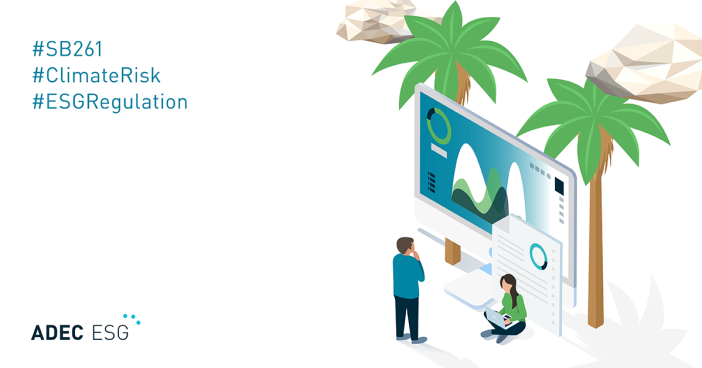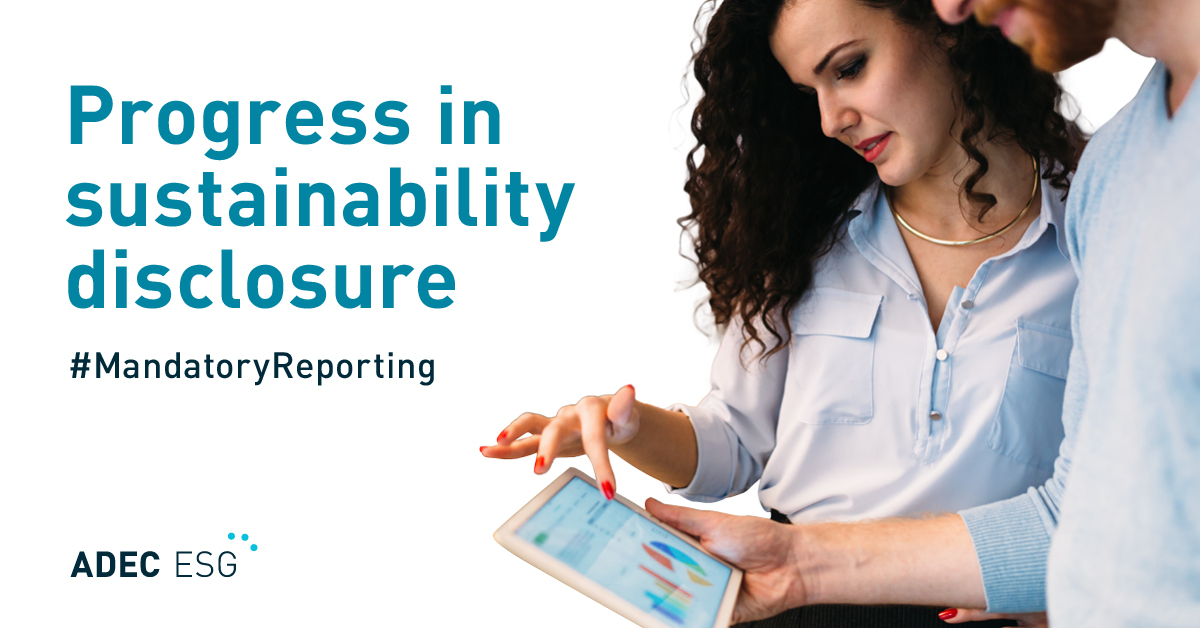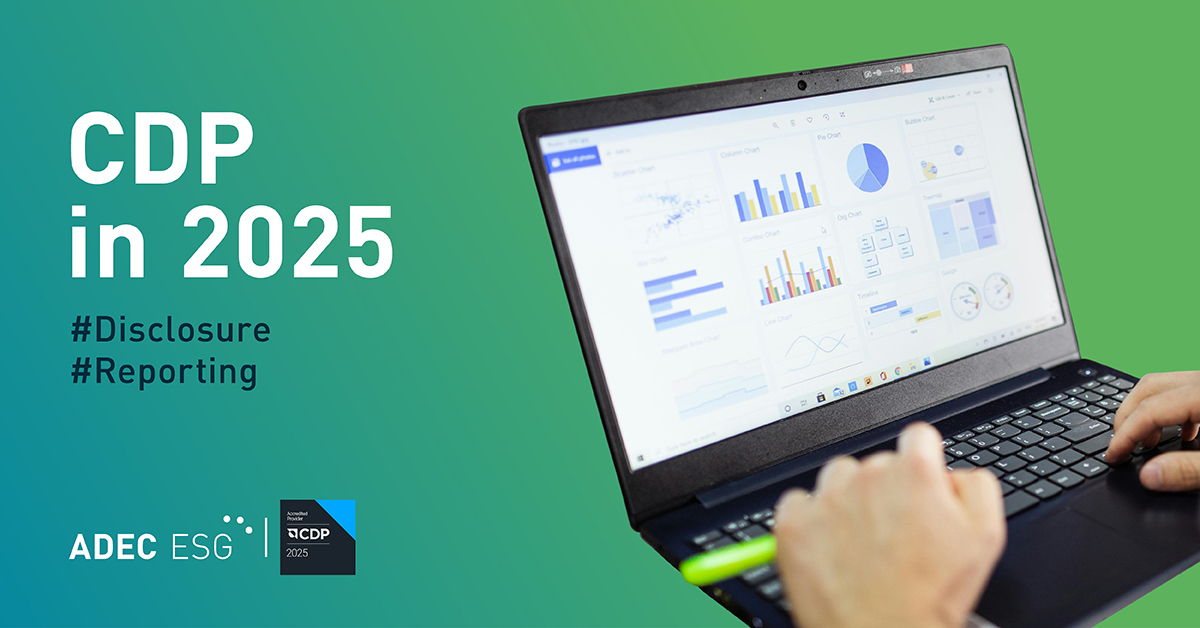This article was updated on August 28, 2025 to bring our information in line with updates provided during CARB’s August 21 virtual public workshop.
In October 2023, the state of California passed two climate-related bills into law: the Climate Corporate Data Accountability Act (CCDAA, SB 253) and the Climate-Related Financial Risk Act (CRFRA, SB 261). Together, these new legislative actions impose much more significant climate disclosure obligations on companies doing business in California, starting as early as 2026. While SB 253 mandates the disclosure of GHG emissions aligned with the GHG Protocol, SB 261 focuses on climate-related financial risks.
Below we’ll cover:
- Latest updates to SB 261
- What disclosures are required under SB 261?
- What is SB 261’s timeline for implementation?
- Does SB 261 apply to my company?
- We anticipate being a covered entity under SB 261 but have not developed a comprehensive climate and/or sustainability plan. Where do we start?
- Does my company reporting need to follow TFCD recommendations or IFRS S2?
- Is climate risk scenario analysis required under SB 261?
Latest updates to SB 261
The California Air Resources Board (CARB) held a virtual public workshop in May 2025 to describe the bill requirements, anticipated rulemaking timeline, and to solicit further public comments. While CARB has not finalized its rulemaking, a Frequently Asked Questions (FAQ) document was published on July 9, 2025 to provide interim guidance on the process, goals, and applicability of both SB 253 and SB 261. CARB is committed to developing a regulation by the end of 2025.
Relevant updates to SB 261 include:
- Proposed definitions of “revenue,” “doing business in California,” and for “parent” and “subsidiary” companies; CARB is soliciting public feedback on these to include in the regulation.
- CARB will host a public docket for covered entities to post the link to their climate disclosure report, starting December 1, 2025. This will provide a centralized location from where the public may access all covered entities’ reports.
- While the SB 261 bill text specifies that companies should disclose their climate related financial risks in accordance with TCFD (or subsequent publication), the FAQ document suggests leniency in choosing a reporting framework, as long as companies are disclosing material climate-related financial risks. Health and Safety Code § 38533(a)(2) defines “climate-related financial risk” as material risk of harm to immediate and long-term financial outcomes due to physical and transition risks, including, but not limited to, risks to corporate operations, provision of goods and services, supply chains, employee health and safety, capital and financial investments, institutional investments, financial standing of loan recipients and borrowers, shareholder value, consumer demand, and financial markets and economic health.
- Initial climate-related financial risk reports may cover fiscal years (FY) 2023-2024 or FY 2024-2025, depending on the organization and the availability of data at the time of publication.
- To provide a phase-in period for reporting, CARB is unlikely to assess penalty fines for inadequate and/or incomplete reports—through it is not precluded from doing so—as long as an entity’s climate-related financial risk disclosures are published with good faith measures to comply with the reporting requirements. It is understood that data quality and sources may not have been developed before the FY reporting period.
What disclosures are required under SB 261?
The bill requires companies that fall within its scope to prepare a climate-related financial risk report once every two years.
Crucially, it calls for the report to be created in alignment with the recommendations set forth by the Task Force for Climate-Related Financial Disclosures (TCFD), published in 2017, or any subsequent publication thereto. The TCFD recommendations are the foremost standard for climate-related financial disclosures and have been utilized and recognized by frameworks and governments around the world. They are structured around four thematic areas that represent core elements of how organizations operate: governance, strategy, risk management, and metrics and targets around climate-related risks and opportunities.
In short, under SB 261, the climate-related financial risk report should:
- disclose the company’s material climate-related financial risks, in alignment with the TCFD’s recommendations
- disclose measures adopted to reduce and adapt to that risk
- explain any reporting gaps and describe plans to address them
- be publicly available on the company’s website
SB 261 also requires the state board to issue administrative penalties to companies that fail to make their disclosures publicly available or that publish insufficient data.
Lastly, reporting companies are required to pay an annual fee to cover the state board’s implementation of the bill.
What is SB 261’s timeline for implementation?
Reports are due to be publicly available by January 1, 2026. Following this, updated reports should be published biennially.
Does SB 261 apply to my company?
Mandatory reporters include any U.S. corporation or business entity that does business in California and whose total annual revenues exceed US$500 million. For subsidiaries, reports may be consolidated at the parent company level. Several thousand companies are expected to fall within the bill’s scope.
SB 261 specifically excludes entities that are in the business of insurance (or are subject to regulation by the Department of Insurance).
We anticipate being a covered entity under SB 261 but have not developed a comprehensive climate and/or sustainability plan. Where do we start?
This situation is more common in industries and business models that have not typically needed to disclose climate or sustainability metrics in the past, like privately-held and professional services firms. To start, it is best practice to:
1. Conduct a gap analysis to a framework like TCFD.
This includes mapping existing statements, reporting, processes, and policies to the disclosure data points in the standard. There may be a need to include multiple disciplines within the company to gather needed information, such as legal, human resources, risk management, facilities, and procurement. Benchmarking peer firms is another way to identify what other firms in your industry are disclosing around climate resiliency, which can help prioritize focus areas.
2. Identify which gaps may be closed before the reporting deadline.
While there is no specific performance required under TCFD-alignment, and it is acceptable to disclose that there is no target (or policy, process, etc.), a company will need to communicate how and when it intends to close the gaps. Because the climate-related financial risk reports will be available to the public—and are likely to be used a tool of comparison against peers when making financial and investment decisions—it is good business practice for a company to make concerted efforts to close as many gaps as possible before publishing its report.
3. Prepare and publish a climate-related financial risk report.
Prepare your climate-related financial risk report and make it publicly available, typically on a company’s website. TCFD provides a straightforward outline of its disclosure guidelines, and a company may utilize this format to comply with SB 261.
Companies may conduct the reporting process internally, or engage outside consultants to help provide guidance and support around climate-related financial risk identification and disclosure.
Does my company reporting need to follow TFCD recommendations or IFRS S2?
The SB 261 bill text specifies that entities should publish their climate-related financial risk reports in accordance with TCFD, equivalent jurisdictional standard, or subsequent publication. Because TCFD was disbanded in October 2023, the subsequent publication is likely to become the ISSB IFRS S2 climate standard, which builds upon and expands the TCFD recommendations. CARB will allow entities to use the TCFD framework to comply with the first reporting cycle, and it is still unknown whether the minimum reporting standard will remain TCFD or be augmented to IFRS S2 in the next biennial reporting cycle.
Is climate risk scenario analysis required under SB 261?
While climate-related scenario analysis is a best practice mechanism to evaluate, mitigate, and communicate long-term climate resiliency, the TCFD recommends, but does not require scenario analysis of physical and transition risks (and opportunities). CARB has also confirmed that scenario analysis is not required under the first reporting cycle during it’s August 21, 2025, public workshop. If a company has developed a process to assess physical risk and transition risk, and taken the next step to include future scenarios, these should be articulated in the climate-related financial risk report. This type of climate resilience assessment also provides companies an advantage in IFRS S2 disclosure compliance since scenario analysis is required under the standard.
Previous legal challenges
Fewer than four months after it was passed, the California Climate Accountability Package has faced legal challenges. In January 2024, a number of groups—the U.S. Chamber of Commerce, the California Chamber of Commerce, the American Farm Bureau Federation, business federations from L.A. County and Central Valley, and the Western Growers Association—filed a lawsuit against the California Air Resources Board in federal court, seeking to block and overturn both SB 253 and SB 261. The lawsuit alleges that the bills violate the First Amendment, are unconstitutional, attempt to extend the state’s reach beyond its legal jurisdiction, and force companies to incur unreasonable costs to comply.
With California now seeking to have the lawsuit dismissed, one of the bills’ primary sponsors, Senator Scott Wiener, responded in a press release, calling the challenge “climate denial” and an attempt to “block basic transparency for the public.” The case is set to be considered in June 2024.
Despite legal challenges to the bill, companies should still take steps to meet the requirements laid down in SB 261 and SB 253. Other climate-related legislation—both in the U.S. and abroad—are set to come into effect over the next several years. This, in addition to a growing number of investors asking for and incorporating ESG information into their decision-making, should be an indication to companies around the world that climate disclosures—in some capacity—are here to stay.
ADEC ESG supports global companies as they work towards their sustainability goals and rise to meet ever-growing ESG reporting requirements. From frameworks like CDP and EcoVadis to regulatory mandates like the CSRD, the SEC’s climate rule, and SB 253 and SB 261, our experts provide our clients with an integrated perspective informed by in-depth ESG reporting and disclosure experience. Talk to our team today to find out how we can help you meet your ESG goals.
This blog provides general information and does not constitute the rendering of legal, economic, business, or other professional services or advice. Consult with your advisors regarding the applicability of this content to your specific circumstances.



